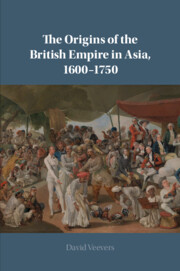Book contents
- The Origins of the British Empire in Asia, 1600–1750
- The Origins of the British Empire in Asia, 1600–1750
- Copyright page
- Dedication
- Contents
- Maps
- Acknowledgements
- Maps
- Introduction
- Part I Weakness and Adaptation
- Part II Subordination and Expansion
- Part III Limitations and Devastation
- Part IV Empire
- 8 ‘The End of These Things Will Not Be Good’
- Conclusion
- Bibliography
- Index
8 - ‘The End of These Things Will Not Be Good’
Legacies of Empire in Mid-Eighteenth Century India
from Part IV - Empire
Published online by Cambridge University Press: 20 May 2020
- The Origins of the British Empire in Asia, 1600–1750
- The Origins of the British Empire in Asia, 1600–1750
- Copyright page
- Dedication
- Contents
- Maps
- Acknowledgements
- Maps
- Introduction
- Part I Weakness and Adaptation
- Part II Subordination and Expansion
- Part III Limitations and Devastation
- Part IV Empire
- 8 ‘The End of These Things Will Not Be Good’
- Conclusion
- Bibliography
- Index
Summary
The final chapter returns to the Indian subcontinent to reveal the durability of the Company’s expansion within the carapace of Mughal sovereignty by the mid-eighteenth century. Although traditionally understood as a period of Mughal decline, largely facilitated by the ‘rise’ of the Company, this chapter argues that the two were not mutually exclusive, and in fact the continued expansion of the Company within a Mughal framework contributed to the empire’s continued authority on the Indian subcontinent, as the networks of Company servants helped bind the emperor in Delhi to the regional nawabs into the 1750s. For example, the imperial farman of 1716 provided the Company with its greatest set of rights yet, including customs-free trade and the territorial expansion of most of its main settlements, such as Calcutta and Madras. The Company’s negotiations to implement these rights with the empire’s various regional governments served to embed the Company even further into these regions, even as the nawabs assumed greater local powers themselves. Many of these negotiations continued to be shaped by the private transcultural networks between Company servants and Mughal elites, and despite the emergence of a powerful and more capable British nation-state in the early eighteenth century, one that made various claims on the Company in Asia, these intimate and cross-cultural ties proved remarkably resilient.
Keywords
- Type
- Chapter
- Information
- The Origins of the British Empire in Asia, 1600–1750 , pp. 245 - 269Publisher: Cambridge University PressPrint publication year: 2020

